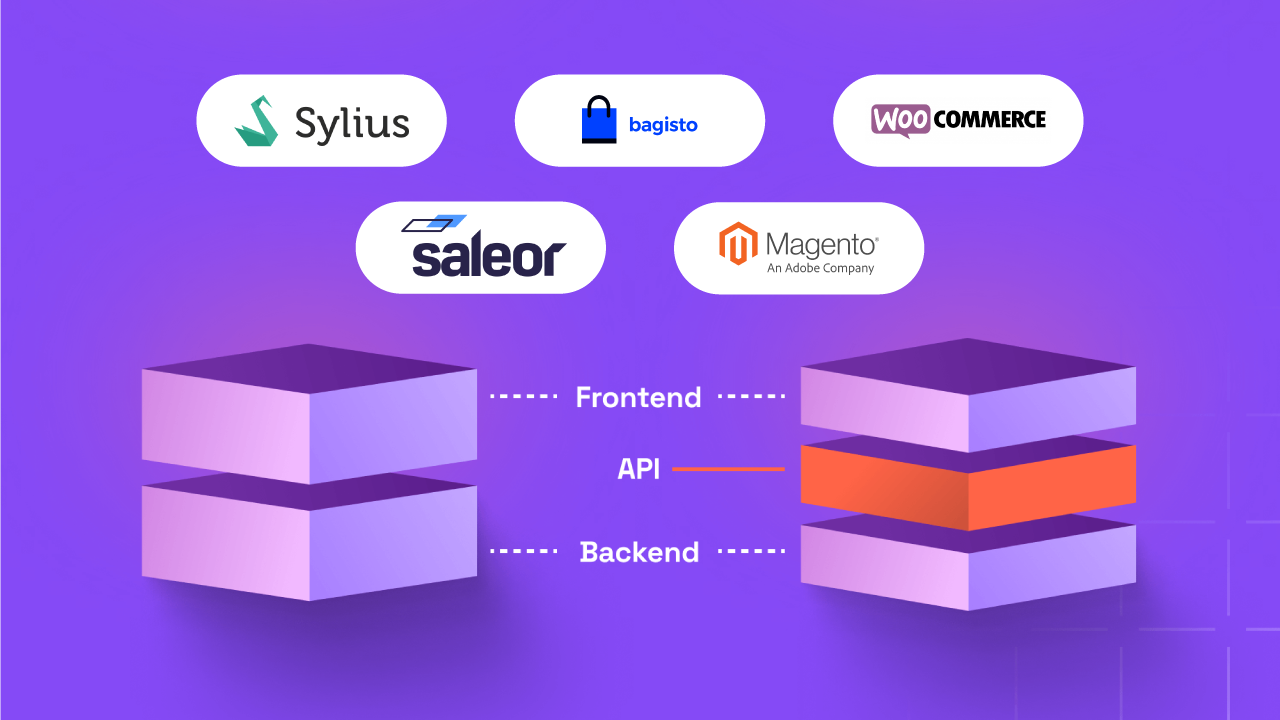5 Best Open-Source Headless eCommerce Platforms

Open-source Headless eCommerce platform combines two technology approaches that provide businesses with a high degree of customization and control over their online retail environments.
In essence, Open Source Headless eCommerce retains the headless architecture but with the added advantage of being open source. This means that the source code is freely available for anyone to view, modify and distribute.
In 2023, the headless eCommerce sector not only witnessed a significant 25% growth but also a pivotal shift in its technological landscape. This surge underscores more than a mere trend; it signifies a transformative movement within the digital commerce arena, with headless technology driving unprecedented levels of innovation and flexibility.
Headless eCommerce, at its core, represents a paradigm shift in digital commerce. It decouples the front-end presentation layer from the back-end engine running a website. This separation facilitates an array of bespoke customer experiences, tailor-made for varied digital touchpoints.
Here are the top five open source headless eCommerce platforms.
Top Five Open Source Headless eCommerce Platforms
Bagisto: An Open-Source Headless eCommerce Platform for Customizable eCommerce Solutions
Bagisto has made a notable impact in the open-source headless eCommerce arena. It’s built on Laravel, one of the most popular PHP frameworks, offering a blend of flexibility and customization. This platform is particularly favorable for businesses prioritizing a mobile-first approach.
Key Benefits and Features:
- Mobile-First Focus: Bagisto’s support for Progressive Web Apps (PWA) ensures an optimal user experience on mobile devices.
- API-Driven Commerce: The platform offers a robust RESTful API, facilitating seamless integration with various systems and applications.
- Customizable eCommerce Experience: Tailored for businesses that need specific and unique eCommerce functionalities, Bagisto offers extensive customization options.
Ideal Use Cases:
- Mobile-Centric Businesses: Ideal for companies where mobile user engagement is a priority.
- Emerging Startups and SMEs: Its scalability and ease of use make Bagisto well-suited for smaller businesses embarking on their eCommerce journey.
- Custom Solution Seekers: For businesses requiring unique eCommerce capabilities, Bagisto’s adaptable nature makes it a strong contender.
Magento (Adobe Commerce): Scalability and Customization for Advanced eCommerce
Magento (Adobe Commerce) is a renowned name in the open-source headless eCommerce platform market. Known for its scalability and extensive customization options, Magento caters to a wide range of business needs, from small enterprises to large-scale retailers.
Key Benefits and Features:
- Unmatched Scalability: Magento effortlessly handles a growing number of products and customers, making it ideal for businesses looking to expand.
- Extensive Customization: The platform offers endless possibilities for customization, allowing businesses to create unique shopping experiences.
- Advanced Analytics and Reporting: Magento provides powerful tools to analyze customer behavior and sales, aiding in strategic decision-making.
- Robust Integration Capabilities: With a wide range of plugins and extensions, Magento integrates seamlessly with various business systems and applications.
Ideal Use Cases:
- Large-Scale Retail Operations: For businesses with extensive product ranges and complex sales processes, Magento offers the necessary robustness.
- Businesses Seeking Tailor-Made Solutions: Magento is well-suited for companies needing bespoke functionalities beyond standard eCommerce features.
- Organizations with Development Resources: Magento’s complexity is best navigated by businesses with access to web development expertise.
Saleor: High-Performance eCommerce with Modern API Technologies
Saleor stands out as a high-performance, open-source headless eCommerce platform. It’s renowned for its scalability and use of modern API technologies, particularly GraphQL. Saleor is designed for businesses that need a fast, efficient, and flexible eCommerce solution.
Key Benefits and Features:
- GraphQL API: Saleor leverages GraphQL, offering a highly efficient and flexible way to interact with data, ensuring a seamless experience for both developers and users.
- High Performance: Known for its speed and responsiveness, Saleor provides a swift shopping experience, crucial for retaining customers and improving conversion rates.
- Scalability: Easily adaptable to the growing needs of a business, Saleor can handle increasing traffic and product listings with ease.
- Dynamic User Interfaces: With its headless architecture, Saleor allows the creation of dynamic, custom user interfaces for a unique brand experience.
Ideal Use Cases:
- Tech-Forward Businesses: Companies looking for a modern, API-driven platform will find Saleor’s technology stack particularly appealing.
- Growing eCommerce Sites: Its ability to scale makes Saleor a great choice for businesses experiencing rapid growth.
- Custom User Experience Seekers: Businesses desiring to create custom, dynamic user interfaces will benefit from Saleor’s flexibility and headless architecture.
Sylius: Modular and Developer-Friendly eCommerce Platform
Sylius is a prominent name in the open-source headless eCommerce space, distinguished for its flexibility and developer-friendly environment. Built on the Symfony framework, it offers extensive customization capabilities, making it a go-to choice for developers seeking a modular and adaptable eCommerce solution.
Key Benefits and Features:
- Symfony Framework: Utilizes the Symfony PHP framework, known for its stability and flexibility, enhancing the development process.
- High Customization: Offers extensive possibilities for customization, allowing businesses to tailor their online store to exact specifications.
- Ease of Integration: Sylius’s modular architecture makes it easy to integrate with various systems and applications, streamlining business operations.
- Developer-Oriented: Its design and tools cater to developers, offering a rich environment for creating bespoke eCommerce solutions.
Ideal Use Cases:
- Businesses with Specific Needs: Ideal for companies requiring specific functionalities not offered by standard eCommerce platforms.
- Developer-Centric Organizations: Businesses with in-house or dedicated development teams will find Sylius’s environment conducive to innovation.
- Scalable eCommerce Projects: Its modular nature makes Sylius suitable for projects that anticipate future expansion and complexity.
WooCommerce: User-Friendly and Versatile eCommerce on WordPress
WooCommerce is a powerful open-source headless eCommerce platform known for its seamless integration with WordPress. It stands out for its user-friendly interface and extensive plugin ecosystem, making it a favorite among small to medium-sized businesses.
Key Benefits and Features:
- WordPress Compatibility: Integrates flawlessly with WordPress, offering a familiar environment for many users.
- Ease of Use: Known for its straightforward setup and management, making it accessible even for those with limited technical expertise.
- Extensive Plugin Ecosystem: WooCommerce’s vast array of plugins and extensions allows businesses to add a wide range of functionalities to their online store.
- Scalability: While it’s user-friendly for beginners, WooCommerce can also scale to meet the needs of growing businesses.
Ideal Use Cases:
- WordPress Users: Businesses already using WordPress for their website will find WooCommerce to be a natural fit.
- Small to Medium-Sized Businesses: Its ease of use and flexibility make it ideal for small to medium enterprises venturing into online sales.
- Businesses Seeking Extensive Customization: With its wide range of plugins, WooCommerce is well-suited for businesses that require specific functionalities to meet their unique eCommerce needs.
What the Future Holds?
As we stand at the precipice of a new era in eCommerce, the landscape is being reshaped by the innovative force of open-source headless platforms. These platforms are not just tools; they are the harbingers of a future where flexibility, scalability, and customization become the cornerstones of digital commerce.
Open Source Headless platforms like Magento, Saleor, Sylius, and WooCommerce are paving the way for a more adaptable and innovative future. These platforms are changing the game, offering businesses the tools to stay agile and responsive to evolving market trends and consumer preferences.
Looking forward, the potential of these platforms is boundless. With advancements in technology, such as AI, ML, and AR, the integration of these cutting-edge tools with open-source headless platforms could revolutionize how we think about online shopping experiences. The future of eCommerce is set to be more dynamic, more personalized, and more connected than ever before.
Reading Suggestions:
5 Signs it’s Time to Consider Headless eCommerce



